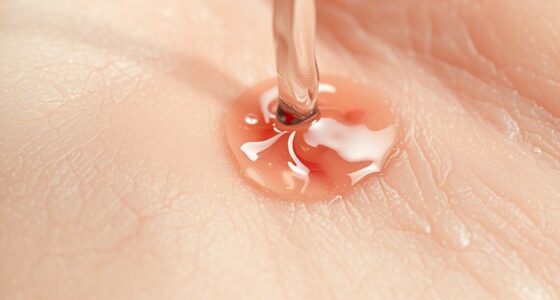To care for your dentures, handle them carefully, cleaning daily with a soft brush and non-abrasive cleaner, and avoid hot water. Store them in a ventilated container with water when not in use, and visit your dentist regularly to check their fit and condition. Practice good oral hygiene for your natural teeth and gums, and follow dietary tips to prevent damage. Keep learning how to maintain your smile and overall oral health effectively.
Key Takeaways
- Handle dentures carefully, using a towel or basin to prevent accidental drops during cleaning or handling.
- Clean dentures daily with a soft brush and non-abrasive cleaner; rinse thoroughly to remove debris and residues.
- Remove dentures after meals, rinse, and store in a ventilated container with water or soaking solution when not in use.
- Regularly visit the dentist for check-ups to ensure proper fit, assess wear, and address any oral health issues.
- Maintain good oral hygiene by brushing natural teeth, gums, and tongue daily to prevent infections and support overall oral health.
Understanding Different Types of Dentures

Understanding the different types of dentures is essential for guaranteeing proper oral care for seniors. Denture materials vary, including acrylic, porcelain, and flexible plastics, each offering different benefits in comfort and durability. Full dentures replace all teeth, while partial dentures fill gaps and prevent remaining teeth from shifting. You might also consider implant options, which involve anchoring dentures securely to your jawbone for enhanced stability and function. Implant-supported dentures are more stable than traditional ones, providing better chewing ability and comfort. Knowing these options helps you choose the best fit for your needs and lifestyle. Additionally, proper denture maintenance is crucial to prolong their lifespan and prevent oral health issues. Properly understanding your denture type ensures you can maintain your oral health effectively and enjoy a confident smile.
Daily Cleaning Routines for Dentures

Maintaining a clean mouth and dentures daily is essential to prevent oral infections, bad odors, and damage. To achieve this, establish a routine of denture cleaning each day. Remove your dentures carefully and rinse them under running water to wash away loose debris. Use a soft-bristled brush and a non-abrasive denture cleaner or mild soap to thoroughly scrub all surfaces, including clasps and fitting surfaces. Avoid using regular toothpaste, which can scratch the denture surface. Rinse well after cleaning to remove any residue. Consistent denture cleaning supports good oral hygiene and helps prevent plaque buildup, mouth sores, and staining. Incorporating proper color accuracy in your cleaning routine can also help identify stains or discoloration early. Incorporate this routine into your daily habits to keep your dentures fresh, functional, and comfortable.
Proper Handling and Storage of Dentures

To keep your dentures in good condition, it’s important to handle and store them properly. Proper handling prevents damage and ensures effective denture cleaning. When cleaning, hold your dentures over a towel or basin filled with water to avoid breakage if dropped. For storage safety, always keep your dentures in a safe, ventilated container when not in use. Here are three tips to follow:
- Rinse dentures thoroughly after eating to remove food particles.
- Use a storage container filled with water or a denture soaking solution to prevent warping.
- Keep your dentures away from heat sources and out of reach of children or pets.
- Regular check-ups with your dentist can help ensure your dentures fit well and remain in good condition.Denture maintenance helps extend their lifespan and maintain oral health.
Following these steps helps maintain denture integrity and supports good oral hygiene.
Recognizing Signs of Denture Problems

When your dentures don’t fit properly or cause discomfort, it’s a clear sign something might be wrong. Ill-fitting dentures can lead to sore spots, difficulty speaking, or trouble chewing. You should also watch for signs of allergic reactions, such as persistent redness, swelling, or irritation in your mouth. If you notice these symptoms, avoid using the dentures until you consult your dentist. It’s important to contemplate proper denture disposal if they become damaged or worn out; using old or broken dentures can worsen problems. Pay attention to unusual tastes or bad odors, which may indicate buildup or infection. Recognizing these signs early helps prevent further oral health issues and ensures you get the right treatment to keep your mouth healthy. Additionally, staying informed about denture maintenance can help prolong their lifespan and improve comfort.
Maintaining Oral Hygiene for Natural Teeth and Gums

If you notice signs of denture issues, it’s a good reminder to also pay attention to your natural teeth and gums. Proper oral hygiene helps control oral bacteria and prevents gum inflammation. To keep your natural teeth healthy, consider these steps:
- Brush twice daily with fluoride toothpaste to remove plaque and reduce oral bacteria.
- Floss daily to eliminate food particles and plaque between teeth.
- Rinse with an antimicrobial mouthwash to further prevent gum inflammation and bacterial buildup.
- Incorporate essential oils such as tea tree oil or eucalyptus oil into your oral care routine to enhance antimicrobial effects and support oral health. essential oils for oral health
Maintaining good oral hygiene reduces the risk of gum disease and keeps your natural teeth strong. Be proactive by scheduling regular dental checkups, which help catch problems early. Consistent care ensures your mouth stays healthy alongside your dentures.
Managing Denture Fit and Comfort

Are your dentures feeling uncomfortable or loose? This can make daily activities frustrating. One solution is denture relining, which restores a better fit by adding material to the underside of your dentures. Regular relining can improve comfort and stability. If you’re still experiencing issues, consider adhesive options designed for dentures. Denture adhesives can enhance retention, especially during meals or speech, providing extra confidence. However, avoid overusing adhesives, as they can affect oral health if not used properly. Schedule regular check-ups with your dentist to assess fit and determine if relining or other adjustments are needed. Properly fitted dentures not only improve comfort but also help maintain your overall oral health, so don’t hesitate to seek professional advice when needed.
Dietary Tips for Denture Wearers

When eating with dentures, choosing soft foods can make meals more comfortable. You should also limit hard textures that could damage your dentures and opt for nutrient-rich options to stay healthy. Making these adjustments helps you enjoy a balanced diet without discomfort or risk. Additionally, being cautious with denture-friendly foods can prevent unnecessary wear and improve overall comfort during meals.
Soft Food Choices
Choosing soft foods is essential for seniors with dentures to guarantee comfortable eating and proper nutrition. Soft foods help reduce discomfort and protect oral sensitivity, making mealtime more enjoyable. To keep things interesting, focus on flavor variety and nutrient-rich options. Here are three tips:
- Incorporate mashed fruits and vegetables like bananas, cooked carrots, or sweet potatoes for easy digestion and flavor diversity.
- Opt for tender proteins such as scrambled eggs, fish, or soft poultry, which require minimal chewing.
- Use dairy products like yogurt, cottage cheese, or smoothies to add creaminess and essential nutrients.
Limit Hard Textures
To protect your dentures and make eating more comfortable, it’s important to limit hard textures in your diet. Hard foods, like nuts, hard candies, and raw vegetables, can damage your denture materials or cause cracks. When you chew these tough items, you risk loosening or breaking your dentures, leading to costly repairs. Incorporate softer alternatives to guarantee proper nutrition while safeguarding your oral health. Proper oral health education emphasizes that gentle foods help extend the lifespan of your dentures and prevent discomfort. Always be mindful of the textures you consume, especially if you notice any looseness or discomfort. By choosing foods with softer textures, you protect both your dentures and your oral health, ensuring a more comfortable and confident eating experience. Additionally, understanding necessary cookies can help you manage your preferences for website privacy and functionality.
Nutrient-Rich Options
Eating a balanced, nutrient-rich diet is crucial for maintaining your overall health and supporting your mouth and dentures. Consuming nutrient-dense foods ensures you get essential vitamins and minerals that promote oral health and strength. To maximize your intake, focus on:
- Incorporating vitamin-rich options like leafy greens, berries, and citrus fruits to boost your immune system and oral tissue health.
- Including protein sources such as eggs, yogurt, and lean meats to support tissue repair and maintain jaw strength.
- Choosing soft, nutrient-dense foods like mashed vegetables, smoothies, and cooked grains that are easy to chew and provide essential nutrients.
- Using modern fixtures and appliances can make meal preparation easier, ensuring you can access nutritious foods comfortably and efficiently.
These dietary choices help keep your mouth healthy, reduce discomfort, and ensure your dentures fit comfortably while supporting your overall well-being.
Regular Dental Check-Ups and Professional Care

Regular dental check-ups are essential to keep your dentures in top shape and your mouth healthy. During these visits, your dentist can perform professional denture maintenance and catch any issues early. Staying consistent with appointments guarantees your smile stays comfortable and functional. Additionally, these visits serve as an opportunity to discuss dental health maintenance strategies tailored to seniors with dentures.
Routine Dental Visits
Scheduling routine dental visits is essential for maintaining the health of your dentures and your overall oral hygiene. Regular check-ups help monitor the condition of your denture materials and ensure they fit properly, preventing discomfort. During visits, your dentist can assess the effectiveness of your denture adhesives and make adjustments if needed. Regular visits also support the maintenance of your oral health, which can impact your overall well-being.
Consider these key points:
- Your dentist will examine your dentures for signs of wear or damage that could compromise fit or function.
- They can professionally clean your dentures, removing plaque and stains.
- Routine visits allow early detection of oral health issues, such as infections or gum problems, that could affect your denture wear.
Consistent visits help keep your smile healthy and comfortable.
Professional Denture Maintenance
Professional denture maintenance is a essential part of keeping your dentures in top condition. Regular dental check-ups ensure your denture material remains intact and free from damage or wear. During these visits, your dentist can professionally clean your dentures, removing plaque and stains that daily cleaning might miss. Proper maintenance helps prevent oral health issues like infections or gum irritation caused by bacteria buildup. Additionally, your dentist can evaluate the fit of your dentures, making adjustments if necessary to avoid discomfort or slippage. Routine professional care not only prolongs the lifespan of your dentures but also supports overall oral health. Trusting experts with your denture maintenance keeps your smile healthy, comfortable, and functional for years to come.
Avoiding Common Mistakes in Denture Maintenance

To keep dentures in good condition, maintaining proper care is vital to avoid common mistakes that can lead to damage or discomfort. Here are three key tips:
- Avoid using harsh cleaning agents or abrasive brushes, which can damage your dentures and make denture repair more difficult. Instead, use gentle cleansers and soft brushes.
- Don’t overlook oral rinses; they help prevent infections and maintain oral health, reducing discomfort and the risk of oral issues.
- Never soak dentures in hot water, as it can warp them, making proper fit impossible. Regularly inspect your dentures for cracks or chips and seek professional help if needed.
Tips for Enhancing Confidence and Oral Health

Maintaining good oral health and confidence as a denture wearer starts with simple daily habits. Regular cleaning preserves denture material durability and prevents infections. Practice proper oral health education, understanding how to handle and care for your dentures effectively. Confidence improves when you take care of your dentures and avoid common issues like bad odors or discomfort.
| Tip | Benefit |
|---|---|
| Clean dentures daily | Prevents buildup and odor |
| Remove and rinse after meals | Maintains freshness |
| Visit your dentist regularly | Ensures proper fit and health |
| Use recommended cleaning products | Protects denture material |
| Practice good oral hygiene | Keeps mouth healthy |
Staying consistent boosts your confidence and keeps your smile bright.
Frequently Asked Questions
How Often Should Seniors Replace Their Dentures?
You might wonder how often you should replace your dentures. Denture maintenance is essential for age-related oral health, and typically, dentures should be replaced every 5 to 8 years. Over time, they can wear out, become uncomfortable, or ill-fitting, affecting your oral health. Regular dental check-ups help determine when replacement is necessary, ensuring your dentures stay comfortable and functional, supporting your overall oral health as you age.
Are There Specific Foods Seniors Should Avoid With Dentures?
Did you know that 70% of denture wearers experience issues from certain foods? With dentures, you should avoid foods to prevent damage or discomfort. Stick to softer options like mashed potatoes and cooked vegetables. Steer clear of sticky or hard foods, such as caramel or nuts, which can dislodge or crack your dentures. Paying attention to denture food and foods to avoid helps keep your smile healthy and comfortable.
How Can Seniors Prevent Bad Breath Caused by Dentures?
To prevent bad breath caused by dentures, you should focus on proper denture cleaning and breath maintenance. Make sure to clean your dentures daily with a suitable cleaner to remove bacteria and food particles. Remove and rinse them thoroughly each night. Also, brush your gums and tongue to reduce odor-causing bacteria. Regular dental check-ups help guarantee your dentures fit well. Good hygiene and consistent cleaning keep your breath fresh and your smile confident.
What Are the Signs of Allergic Reactions to Denture Materials?
If you notice signs of allergic reactions to denture materials, watch for symptoms like oral irritation, redness, swelling, or sores inside your mouth. Denture allergies can cause discomfort and persistent irritation, so don’t ignore these signs. You might also experience a burning sensation or difficulty eating. If these symptoms occur, consult your dentist promptly to determine if you need different materials or treatment to reduce oral irritation and improve comfort.
Can Seniors Sleep With Dentures in Overnight?
Imagine slipping into a peaceful sleep, knowing your dentures are out. You might wonder if seniors should sleep with dentures in overnight. It’s generally better to remove them to allow your gums to breathe and reduce irritation. Proper denture cleaning and maintaining good oral hygiene help prevent infections. Removing dentures at night keeps your mouth healthier and ensures fresh breath every morning, making your sleep more restful.
Conclusion
Taking care of your dentures is the key to a brighter, healthier smile. Remember, your oral health is the foundation of your confidence and well-being—don’t let it slip away unnoticed. By following proper routines and staying vigilant, you can keep your dentures comfortable and your mouth happy. Think of your smile as a garden; with regular attention and care, it will flourish and light up every room you enter.









